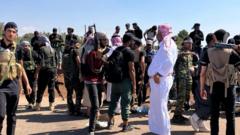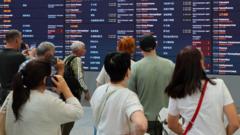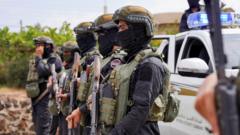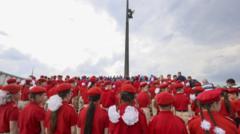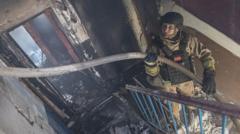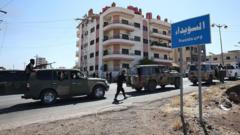As peace talks are set to take place in Istanbul, Ukrainian President Volodymyr Zelensky expresses skepticism about Russia's commitment to meaningful negotiations, highlighting Moscow's lack of clarity on ceasefire conditions while emphasizing Ukraine's readiness for a full ceasefire.
Tensions Mount as Ukraine Accuses Russia of Sabotaging Peace Talks

Tensions Mount as Ukraine Accuses Russia of Sabotaging Peace Talks
Ukraine's leadership raises concerns over Russia's willingness to engage productively in peace negotiations, accusing Moscow of obstructing progress.
Ukraine's president, Volodymyr Zelensky, has voiced serious doubts about Russia's dedication to advancing peace discussions as the two nations prepare for a new round of negotiations in Istanbul. The Ukrainian government has accused Moscow of undermining the possibility of productive talks, even as a Russian delegation is confirmed to attend.
Zelensky's concerns come in light of Kremlin spokesman Dmitry Peskov's announcement that Russia's ceasefire conditions would be discussed in Turkey. However, Ukraine has yet to receive any formal negotiating proposals from Russia, which it views as a critical prerequisite for meaningful dialogue. "For a meeting to be meaningful, its agenda must be clear, and the negotiations must be properly prepared," stated Zelensky, stressing that Russia seems intent on making the upcoming talks unproductive.
Previously, Ukraine had already provided its vision of future negotiations to Russia and reaffirmed its willingness for a "full and unconditional ceasefire." This followed an inconclusive initial round of discussions in Istanbul two weeks prior, which resulted solely in a prisoner of war exchange without achieving any significant breakthroughs in peace plans.
Currently, Russia occupies around 20% of Ukrainian territory, including Crimea, annexed in 2014. Amidst growing frustration, Ukrainian Foreign Minister Andrii Sybiha reiterated the need for an unconditional ceasefire from Moscow, which he believes would lay the groundwork for more comprehensive discussions. Sybiha expressed optimism about the continuation of talks, stating the desire to see an end to the war within the year.
Despite anticipation around the Istanbul talks, neither Putin nor Zelensky is expected to attend the discussions. However, Turkish Foreign Minister Hakan Fidan has suggested that a future summit involving leaders from the United States, Russia, and Ukraine should be prioritized to deescalate tensions.
Peskov confirmed that Russia's ceasefire proposals will remain confidential and indicated that an elevation to high-level discussions would only occur if preliminary meetings yield tangible progress. In addition to the ongoing discussions, the situation is further complicated by geopolitical dynamics, including comments from retired U.S. General Keith Kellogg, who suggested that NATO expansion is not a feasible option and that negotiations must persist despite frustrations.
As negotiations loom, Trump's administration continues to involve itself in the discourse surrounding the conflict, emphasizing the need for a ceasefire while simultaneously addressing the broader implications of NATO's expansion bids. Recent responses from Germany's leadership, promising support to Ukraine in producing long-range missiles, also add a layer of complexity, drawing stern warnings from the Kremlin about potential alterations to military policy.
The landscape surrounding the conflict remains volatile, with international powers engaging and analyzing the stakes involved, both for Ukraine and Russia, as the calls for a ceasefire and peacegrow louder amidst ongoing hostilities.





